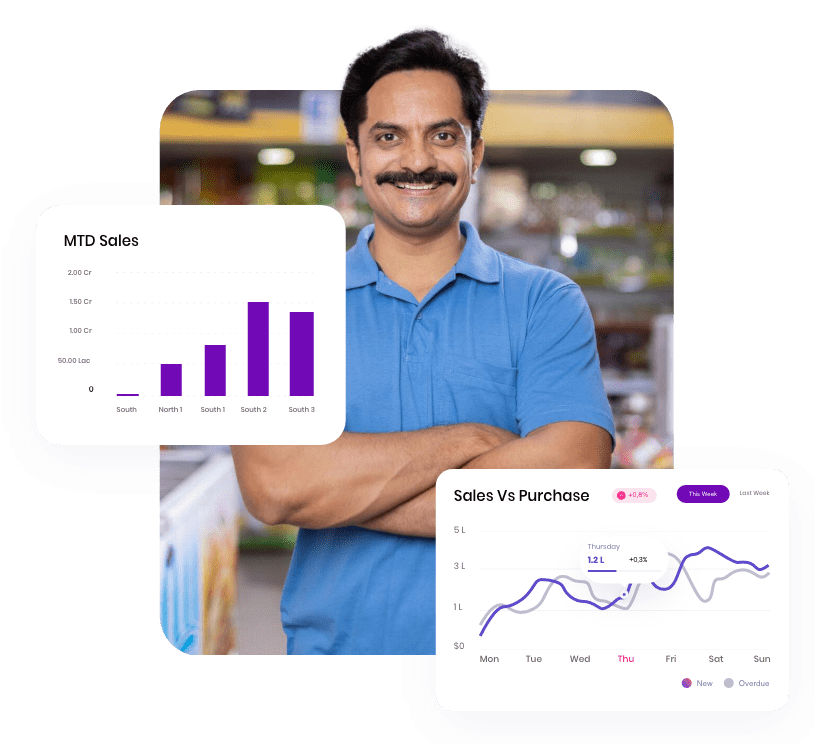
Webinar Recap: Will Agentic AI Disrupt Your RTM—or Supercharge It?
Webinar Recap: Will Agentic AI Disrupt Your RTM—or Supercharge It?

Webinar Recap: Will Agentic AI Disrupt Your RTM—or Supercharge It?

Introducing the AI-Driven Product Recommender to Maximize Basket Size at Every Outlet
We are thrilled to introduce our latest innovation, the Product Recommender, designed to transform the way businesses optimize their product offerings and enhance sales productivity.
In the fast-paced FMCG industry, inventory management isn’t just a back-office function—it’s a critical driver of success. From ensuring product availability to optimizing costs, inventory management directly influences a company’s profitability, efficiency, and competitive edge.
This article delves into five critical reasons why inventory management is a game-changer, examines its challenges and benefits, and explores how Distributor Management Systems (DMS) streamline inventory processes. Additionally, it provides practical tips for improving inventory management.
FMCG companies operate in an intensely competitive environment characterized by high product volumes, short shelf lives, and constantly shifting consumer demand.
Maintaining a smooth flow of goods across the supply chain is essential not only for operational efficiency but also for building trust and loyalty among consumers.
Consider this: a customer reaching for your product in a store finds it out of stock or expired. The likelihood of them switching to a competitor is incredibly high.
Inventory management helps businesses avoid such pitfalls, ensuring that products are always available, fresh, and in optimal condition.
Inventory management involves the systematic control and oversight of the flow of goods throughout the supply chain. In FMCG, this includes tracking perishable goods, monitoring stock in transit, and ensuring timely replenishment to meet consumer demands.
Without a proper inventory management system, businesses face risks such as inflated costs, stock discrepancies, and lost sales due to product unavailability or spoilage.
While maintaining inventory management is crucial, there are several challenges involved.
The following section explores five reasons why inventory management can make or break your FMCG business—the challenges in inventory management, and how solutions like DMS revolutionize inventory processes for the FMCG industry.
Managing inventory in the FMCG sector comes with its own set of challenges due to the dynamic and fast-paced nature of the industry. Here are some of the key hurdles businesses face:
FMCG products often have limited shelf lives, requiring businesses to manage inventory with precision to avoid spoilage and wastage.
Consumer preferences are shifting rapidly. In a saturated market, any inventory mismanagement can lead to the loss of customers to competitors.
FMCG supply chains involve multiple stakeholders, including manufacturers, distributors, retailers, and logistics providers.
Addressing these challenges requires a combination of advanced tools, that offers visibility into the inventory levels, providing actionable insights. This is where Distributor Management Systems (DMS) come into play.
DMS helps businesses be on the top of their inventory levels and ensures products are in the right place at the right time—minimizing costs and maximizing efficiency.
With these capabilities, a DMS empowers businesses to overcome inventory challenges, enhance operational resilience, and improve supply chain efficiency.
To illustrate the importance of inventory management, here are five scenarios where it plays a pivotal role, and how DMS addresses these challenges:
In the FMCG industry, fulfilling customer demand on time is non-negotiable. Stockouts leave customers frustrated, often pushing them to competitors. Conversely, overstocking can lead to expired goods reaching consumers, tarnishing brand reputation. Achieving the right inventory balance ensures that customers always find what they need, enhancing their satisfaction and trust.
Distributor Management Systems (DMS) play a pivotal role by providing distributors with complete visibility into their stock levels. This ensures timely replenishment, preventing both stockouts and overstocking while maintaining optimal inventory levels.
An FMCG company experienced a surge in demand for a festive product but lacked visibility into distributor-level inventory.
The result?
Stockouts at key retail points, leading to lost sales and disappointed customers.
With a DMS, such scenarios can be avoided by ensuring proactive stock replenishment based on demand patterns. Advanced tools like Botree DMS enable companies to automate stock replenishment based on the distributors inventory stock levels. This allows the distributors and the companies to be rest assured and focus more on driving sales growth.
Stockouts aren’t the only risk—expired products reaching consumers pose a serious threat to brand reputation and customer safety. Consuming expired goods can harm consumers and damage trust in the brand. Ensuring that products are in optimal condition when they reach consumers is critical, especially when managing large inventories and multiple distributor channels.
By leveraging Botree DMS, FMCG businesses can not only improve customer satisfaction but also uphold safety and quality standards, ensuring long-term success.
Holding excess inventory inflates storage costs and ties up working capital. Efficient inventory management minimizes these costs by maintaining optimal stock levels.
Regular audits can help identify cost leakages and areas for improvement. With access to detailed reports and analytics, businesses can identify cost-saving opportunities. A DMS helps by:
Botree DMS introduces powerful tools to streamline inventory costs:
The Stock Expiry Report in Botree DMS provides actionable insights into products nearing expiry, enabling companies to proactively manage these stocks. By leveraging the Liquidation Scheme, businesses can prevent potential losses while boosting sales and profitability.
By strategically pushing near-expiry inventory, companies can recover manufacturing costs to some extent, reduce losses, and enhance overall profitability.
For a prolonged partnership, maintaining a healthy relationship is key. In the FMCG business, loss from expired products cannot be undertaken. To help companies and distributors, Botree DMS enables companies to implement Salvage policy. This policy ensures transparent and efficient processes, thus preventing distributors from bearing the entire cost of unsellable goods, thereby reducing losses and strengthening stronger partnerships.
By leveraging these advanced tools, businesses can effectively manage costs while improving operational efficiency and customer satisfaction.
Operational efficiency is paramount, especially in the highly dynamic FMCG supply chain. The supply chain involves multiple stakeholders such as manufacturers, distributors, sales teams, and retailers, all of whom need seamless coordination to maintain smooth operations. Effective inventory management is the backbone of this coordination, reducing errors, delays, and inefficiencies that can disrupt the entire chain.
Botree DMS is designed to transform operations by automating order processing and optimizing workflows across the supply chain. Here’s how it works:
Companies leveraging Botree DMS have reported faster order fulfillment, reduced errors, and improved retailer satisfaction. Enhanced coordination across teams ensures that distributors and salespeople are always aligned, helping businesses maintain a competitive edge in the market.
Accurate demand forecasting is the cornerstone of effective inventory management. By predicting future sales, FMCG companies can maintain optimal stock levels and avoid the pitfalls of overstocking or stockouts.
Let’s understand how inventory management and demand forecasting work hand-in-hand and how a DMS helps in this process;
Real-time data from a DMS allows companies to predict demand more accurately. By analyzing trends and distributor stock availability, businesses can plan for:
Without this visibility, businesses risk making inaccurate forecasts, leading to missed opportunities.
Impact: Improved demand forecasting reduces waste and ensures products are available when and where they’re needed.
In a highly competitive FMCG market, businesses with robust inventory practices are better positioned to respond to market demands and launch new products. Efficient inventory management translates to faster delivery times and better service, giving businesses an edge over competitors.
With real-time inventory tracking, DMS provides actionable insights that empower businesses to make data-driven decisions. Examples include:
It is crucial to ensure your team recognizes the value of tools like a Distributor Management System (DMS) in improving and simplifying day-to-day operations. Sales automation tools streamline order management, provide real-time stock visibility, and enhance accuracy, enabling teams to make informed, data-driven decisions. Additionally, a DMS offers secondary data visibility, empowering businesses to optimize their strategies and drive sales growth effectively.
While modern software like a DMS or inventory management system ensures better control and accuracy, convincing distributors to adopt these tools can be challenging. This is particularly more pronounced in rural areas, where distributors may not be tech-savvy or may lack the necessary infrastructure to support such applications.
To drive successful adoption, businesses must first understand the core challenges and limitations distributors face. Choosing the right DMS—one that effectively addresses business challenges while accommodating distributor preferences—is key to overcoming resistance and driving adoption.
Ensure that employees across the supply chain are well-versed in inventory management practices and tools.
Your distributors are the primary users of DMS applications, so it’s essential to ensure they understand the key functionalities and can effectively leverage its features.
Providing regular onsite and online training programs and establishing strong communication channels with distributors to streamline stock movement and avoid delays can significantly enhance their ability to sell. A DMS facilitates seamless collaboration by providing a centralized platform for real-time data sharing, enabling better demand forecasting and stock replenishment.
Botree DMS offers businesses a powerful suite of tools designed to streamline inventory management, boost profitability, and cut down operational costs. With real-time visibility across distributor channels, Botree DMS allows businesses to track inventory levels at every location, enabling better decision-making. This insight helps businesses forecast demand accurately, understand market trends, and optimize stock distribution, ensuring they are always aligned with customer needs.
The system’s automation features take over routine inventory tasks, keeping businesses on top of stock levels, reordering, and sales, while reducing the risk of stockouts and overstocking. By tracking inventory effectively and minimizing waste, Botree DMS not only ensures optimal inventory but also enhances storage efficiency, driving down costs. This combination of visibility and automation empowers businesses to meet demand, optimize costs, and improve customer satisfaction—all while driving profitability.

Inventory management is the backbone of FMCG business success. From ensuring customer satisfaction to optimizing costs and driving operational efficiency, it impacts every aspect of the supply chain. While challenges like short product lifecycles and dynamic consumer behavior persist, leveraging advanced tools like a DMS can provide the visibility and control needed to thrive.
Invest in effective inventory management today to turn your FMCG business into a well-oiled machine that delivers consistent value to customers and stakeholders alike.
An inventory management system gives distributors a clear view of stock levels, so they can fulfill orders faster and avoid out-of-stocks. That means retail customers are less likely to be kept waiting or told something’s not available. Plus, the system can spot trends, making it easier for distributors to predict what stores need next.
Automated stock replenishment takes the guesswork out of reordering. It keeps an eye on inventory levels and triggers new orders when supplies get low. This helps prevent both overstocking and stockouts, which saves money and keeps shelves stocked without any manual tracking.
Real-time inventory data helps business leaders make faster, better decisions. When they always know what’s in stock, they can quickly solve problems, adjust plans, and take advantage of new opportunities. It also helps prevent surprises, like running out of stocks or losing sales because of inventory mistakes.
With smart tracking and expiry alerts, technology-driven inventory management can help FMCG companies sell items in time. so less stock gets wasted. In the end, It’s a practical way to cut waste and protect profits.
Smart reorder alerts let you know when it’s time to restock, before you run out. This means less last-minute rushing and fewer expensive emergency orders. Teams spend less time worrying about inventory, which makes the whole process smoother and more cost-effective.